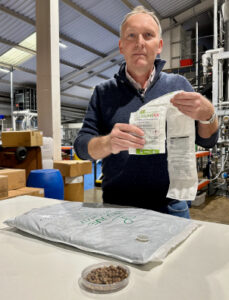Legume Technology has been awarded a grant from The Bill & Melinda Gates Foundation and the UK’s Foreign, Commonwealth & Development Office (FCDO).
The Nottinghamshire company, which has been working on microbial biofertilisers for more than 20 years, will receive £2.15m to develop biofertiliser technology to be more affordable and accessible for small scale producers in Africa.
It’s reported that this could help increase yields in a sustainable, environmentally friendly manner and improve incomes for millions of families across the region.
“These farmers face many challenges,” says Dr Bruce Knight, co-founder and managing director of Legume Technology. “Of which, by far, the most significant is access to nitrogen fertilisers.
“The absence of affordable fertiliser options significantly impacts agricultural productivity and livelihoods,” he says. “Synthetic fertiliser is not only too expensive for many of these families, but increased use would also bring its own environmental problems.”
The work focuses on natural microbes that can capture the nitrogen in the air we breathe and make it available to crops. Biological nitrogen-fixers (BNFs) have been available in the developed world for years, but have generally only worked on crops in the legume family.
It’s hoped that this project will find out how much nitrogen these microbes can fix from the atmosphere when used in non-legume crops such as maize.
“The grant from the Gates Foundation and the UK government will allow us to embark on a new programme of research to identify microbes that can work with non-legume staple crops such as maize, millets, sorghum and cassava,” explains Dr Knight.
Legume Technology will work with research institutes, microbe banks, innovation centres and universities to collect and assess 50 bacterial strains which are known to have a nitrogen-fixing effect.
Its long-term research partner, The University of Nottingham, will screen the strains to identify the best-performing and understand the potential. The top ten strains will then be independently reviewed by the James Hutton Institute. Also working on the project is the Centre for Process Innovation, a government-funded ‘innovation catalyst’ that helps companies develop biotechnology products.
Field-scale trials will follow to validate the findings.
“The second part of the programme is no less exciting,” says Dr Knight. “The foundation’s grant will also allow us to develop specialist packaging for these SSP products.

“Because BNF products are live, quality packaging is very important to maintain shelf life and quality once they’ve left the factory.”
The product is normally shipped in sterilised packaging with enough to treat tens of hectares. However, the average sub-Saharan smallholding is less than half a hectare, making these products too expensive in their current form.
“It’s another major constraint,” Dr Knight points out. “Availability of high-quality crop inputs, in low-volume packaging, is a huge limitation on realising the potential of biofertiliser products in many African countries.
“There’s also a lack of awareness around the existence of these biofertiliser products, and that they work,” Dr Knight adds. “The project includes in-country commercialisation trials to validate the product, demonstrate its reliability and show the gross benefits of yield and quality. We can then investigate logistics and registrations, with a view to developing commercial partnerships.”
The grant will enable the design, build and installation of a new packaging line at Legume Technology’s factory. Dr Knight notes that the proposed design is similar to a crisp packet.
“It’s easily portable and highly affordable, while keeping the contents fresh and free from contamination.”


